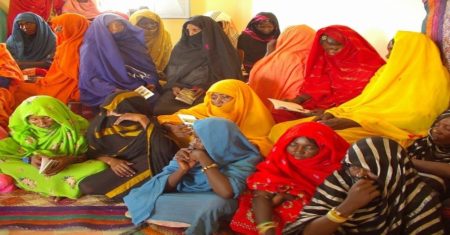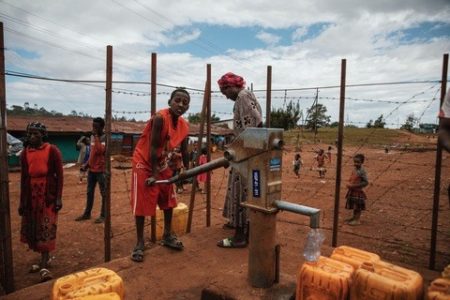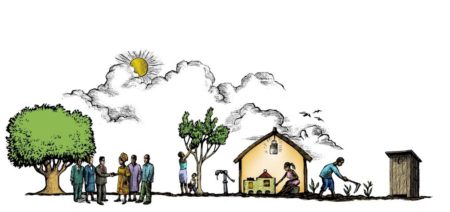
What if most of us have got it wrong? What if….. helping communities move from a place of dependency to a place of independence is not about providing them with skills, inputs, tangibles, but instead about forging relationships which make them feel truly equal to begin with?
These are just some of the thoughts that ran through my head during a recent trip to Ethiopia, courtesy of the organisation Vita. I say ‘courtesy of Vita’ when really I should be saying thanks to the Lifestyle Choices group of the Western province for it is with them that the connection was born. This group of Sisters have been working with Vita for almost ten years and in March of this year I was privileged enough to be able to see for myself just what all the fuss is about!
The first inkling of the relationship focus, integral to how Vita operates, was in the choice of travelling companions. Three professionals – all from different backgrounds and experiences but with, in common, a passion for their chosen field and a genuine interest in wanting to see the local communities benefit from their expertise. This was not about money. Well, OK, it might have been also about money i.e. funding but it was first and foremost these three people willing and able to put their knowledge, their connections and their time at the disposal of the local people.
That was clue number one. The second one was in meeting Vita’s staff on the ground. All local – not a European to be seen and even though most of them were male, it was abundantly clear just how much pride they take in their work and in their articulation of the programme dynamics and impact, just how successful VITA has been. Then, it was about the relationships which underpin their work. VITA staff are not only embedded within the local community – observing their interaction with the local people was like watching friends or neighbours talk about last night’s episode of the latest crime drama, they are the community. There was no distance separating them, no sense of one giving and the other receiving.

The same seemed to apply in the interaction between VITA and the government extension workers (local people salaried by the government to provide expertise and sometimes resources such as seeds for planting, training etc). And here was yet another learning for the writer whose own experience in co-operating with government bodies and staff has been decidedly different, with the success or otherwise of programmes having little to do with government involvement. By comparison it was clear from the outset that for VITA programmes, nothing begins without government workers taking a close and personal interest in any new initiative. VITA seeks out their government counterparts, involving them from the A to Z in how the programme runs. From the smiles on the faces of the government staff it seems they take just as much pride in the successes of the work being done as VITA staff do.
Still on the subject of relationships and again to the surprise of the writer, a consistent and apparently fundamental mechanism of all programmes is the formation of co-operatives among those taking part. When I heard this, dear reader, I almost wept. The time and energy I had spent in trying to set up co-operatives during my past life as a development worker in Uganda and yet, here it not only worked but is considered an integral part of how the programme evolves. “Stronger together” is not a myth here but a conviction.
But here I am waxing lyrically about roles and relationships before describing for you the sights and sounds of a country which I had visited all too briefly a number of years ago. Not for VITA the charms of the capital Addis Ababa but far flung areas – up mountain roads (which are not like roads you or I know), with terrain arid enough for the camels (I kid you not!) to feel right at home. The lack of water an obvious challenge and one which VITA navigates rather originally by rehabilitating water points which have broken down rather than the more traditional approach of drilling new boreholes.

Homes where women are often the sole providers and for whom their place in society depends almost exclusively on their ownership of animals. Their status within the community defined by how far up the ladder they climb after the first rung of chickens, onto the second of goats and reaching the top as the proud owner of one or more cows. For many women owning a cow would have been akin to dreaming “the impossible dream”!

And where does Mercy fit in all this? Well, even prior to my trip, conversation with VITA in Ireland had yielded the possibly simplistic statement “Mercy gives us our values”. Not only was this reiterated by the Lifestyle Choices group but it also seemed to confirm what I had begun to suspect. That VITA does in many ways embody the “missionary approach to development”. Remember that? The MAD article from a previous issue?* Has VITA unknowingly adopted a role usually attributed to religious congregations? In their literature we can read – “Mercy has become something of a yardstick by which we measure many decisions”. This being the case, coupled with VITA’s own efforts to consolidate the Mercy connection through dialogue with other Mercy Provinces and other Mercy entities such as Mercy Global Action, does VITA represent one of those with whom we join “in responding with compassion to critical issues of injustice”? (Congregational Chapter Statement 2018). What do you think?
Maria Douglas
Mercy Mission & Development Co-Ordinator


